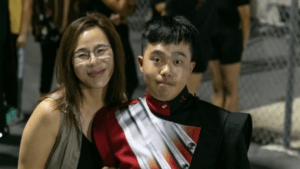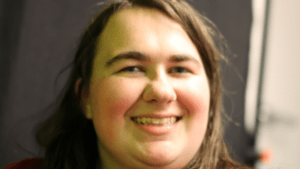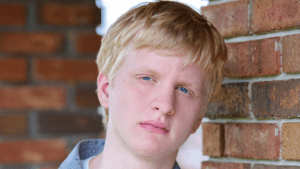This guest post is by Aren Wang, a young man who is diagnosed with autism and plans to attend Chabot College. Aren is applying for the Spring 2024 Making a Difference Autism Scholarship via the nonprofit KFM Making a Difference started by me, Kerry Magro. I was nonverbal till 2.5 and diagnosed with autism at 4, and you can read more about my organization here. Autistics on Autism: Stories You Need to Hear About What Helped Them While Growing Up and Pursuing Their Dreams, our nonprofit’s new book, was released on March 29, 2022, on Amazon here for our community to enjoy featuring the stories of 100 autistic adults.
For a long time, in my mind, “differently wired” was my family’s go-to euphemism for “autism,” a diagnosis I eschewed due to social stigma and a desire to appear “normal.” Often, ASD is either whitewashed as a “different ability” or conjures images of a dangerous cancer that must be “cured.” Neither of these polarizing descriptions resonated with me, so I simply spurned the “autistic” description and called myself “differently wired” for lack of a better label.
Yes, in some ways I was “differently abled,” though I didn’t see this until more recently – I received an A in college organic chemistry at age 16, understood Fermat’s little theorem inside and out, and authored several award winning essays on the topics of optimism and veganism. But I also endured real challenges, such as hypersensitivity to sounds and textures, a poor understanding of social skills, and a fear of changes. Most challenging was my comorbid speech disorder called “cluttering” that deterred me from talking in public, even with people I knew well. (I say cluttering is comorbid because it often reflects my lack of confidence in social cues. When I am unsure how to explain something to someone or what the “correct” way to say it is, my thoughts and words become jumbled.) Labels like “different ability,” however well meaning, erased my experience.
But so did the trope of the burdensome disorder. In an effort to defy this suffocating label, I embarked on a quest to assert my worth. My first step, after Mom’s suggestion, was to enroll in my school spelling bee at age 10 – even though I fully knew, due to my cluttering and my perceived lack of ability in spelling, that I would probably place last. Obviously, spelling “cat” as “C-A-A-A- … – A – T” would be a hard sell to any judge. Even if speaking at the microphone didn’t do me in, the fact that I had a week to prepare would. I tried my best anyways because I wanted to feel proud and also like I could be a “normal” kid doing “normal” things.
To my complete surprise I won! This victory and my newfound spelling prowess pushed me to compete and win in more bees, including the county level in 2015, 2016, 2017, and the junior high state in California in 2017, cluttering notwithstanding. These bees were my preparation for the 2018 Scripps National Spelling Bee, which my formerly dim bubble of aspiration burgeoned to envelope in 2016. The prize for winning was over $40,000 and a towering golden trophy. For 3 years of preparation my mom and I toiled away at a giant Merriam Webster dictionary, where I was quizzed on words and tasked to remember their spelling. This was where the personal strength that came with my autism – pattern matching – began to reveal itself. Instead of rotely memorizing words, I could glean information (origin, definition, pronunciations, etc., though not the spelling!) during bees and practiceto make a highly educated guess on the spelling. For example, knowing that the word “polyphloisboian” meant “loud roaring” and came from the Greek root “phloisbos” meaning exactly that would point me toward the correct spelling.
Finally the big moment arrived one early morning in May 2018. I marched up to the microphone on the Scripps podium, in front of hundreds (or thousands) of audience members and undaunted by my fear of cluttering. While I didn’t take home a golden trophy, I had done what was most meaningful. Not only had I faced my cluttering fears, I had done so in front of a nationwide ESPN streaming and had become an inspirational role model for people learning to face their fears.
It was then that my fortlike resistance to the label of “autism” began to crumble and I began to embrace it. I am not necessarily proud of being autistic, but I am not ashamed either. It’s what makes me unique, just as others (autistic or not) have their own identities that they deem unique. And while the door to spelling bees had closed now that I was in high school, my newfound sense of self-confidence and worth did not. This paved the way for new opportunities or, rather, convinced me to try out existing ones that I would have dismissed before.
In 2019, I joined my local “Newark Optimist Club” and participated in their 2019, 2020, and 2021 essay competitions on various questions regarding optimism, such as “When all the world’s problems are solved, is optimism still necessary?” I won 1st, 2nd, and 1st place on these 3 essays respectively. Despite my cluttering, in 2020 and 2021 I, along with other 1st, 2nd, and 3rd place winners, was invited to read my essays in front of the club! While I’m sure my recital was not without cluttering, the fear of public speaking that struck tremors into my spine was no longer the beast it was before. Last year, which was my college sophomore semester, I joined a Toastmasters’ research group where people with autism would prepare and give speeches in a weekly Zoom meeting. I am glad I participated in that study as it birthed a new connection with me and other autistic people and further bolstered my autistic identity.
If there is one lesson I would share from this, it can be summed in four words: don’t let others define you. Just because someone has a preconceived idea of you doesn’t mean you have to internalize or let it corrode your own unique self. You are the driver in your life. Whether you are the stereotypical “high functioning” autistic genius whose bedroom is piled with trains, or you are like me, or you need to stim every minute of the day, you are worthy as a person regardless. Just like me and everyone else.
Follow my journey on Facebook, my Facebook Fan Page, Tiktok, Youtube & Instagram.
My name is Kerry Magro, a professional speaker and best-selling author who is also on the autism spectrum. I started the nonprofit KFM Making a Difference in 2011 to help students with autism receive scholarship aid to pursue post-secondary education. Help support me so I can continue to help students with autism go to college by making a tax-deductible donation to our nonprofit here.
Autistics on Autism: Stories You Need to Hear About What Helped Them While Growing Up and Pursuing Their Dreams was released on March 29, 2022 on Amazon here for our community to enjoy featuring the stories of 100 autistic adults. 100% of the proceeds from this book will go back to our nonprofit to support initiatives like our autism scholarship program. In addition, this autistic adult’s essay you just read will be featured in a future volume of this book as we plan on making this into a series of books on autistic adults.














